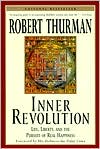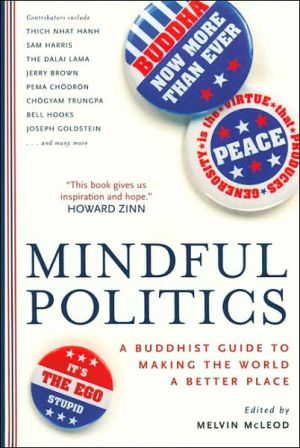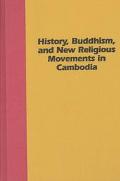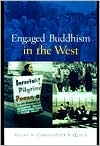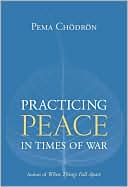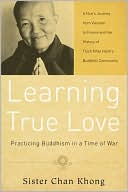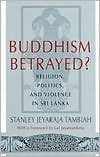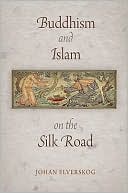Inner Revolution: Life, Liberty, and the Pursuit of Real Happiness
The New York Times calls him "America's number one Buddhist." He is the co-founder of Tibet House New York, was the first American Tibetan Buddhist monk, and has shared a thirty-five-year friendship with the Dalai Lama. Now, Robert Thurman presents his first completely original book, an introduction to Buddhism and "an inspiring guide to incorporating Buddhist wisdom into daily life" (USA Today). Written with insight, enthusiasm, and impeccable scholarship, Inner Revolution is not only a...
Search in google:
The New York Times calls him "America's number one Buddhist." He is the co-founder of Tibet House New York, was the first American Tibetan Buddhist monk, and has shared a thirty-five-year friendship with the Dalai Lama. Now, Robert Thurman presents his first completely original book, "an inspiring guide to incorporating Buddhist wisdom into daily life" (USA Today). Written with insight, enthusiasm, and impeccable scholarship, this is not only a practical primer on one of the world's most fascinating traditions but a wide-ranging look at the course of our civilization--and how we can alter it for the better. "Part spiritual memoir, part philosophical treatise and part religious history, Thurman's book is a passionate declaration of the possibilities of renewing the world." -- Publishers Weekly (starred review) Stephen Prothero "A specter is haunting Europe," Karl Marx wrote 150 years ago in The Communist Manifesto, "the specter of communism." Influenced by Marx's claim that religion is "the opiate of the masses," sociologists have traditionally viewed Buddhism as otherworldly, apolitical, pessimistic, socially apathetic and ethically inert -- the most powerful of religious opiates. Robert Thurman's Inner Revolution is a Buddhist manifesto that stands Marx and the sociologists on their heads. A specter is haunting America, he argues, and it's the friendly ghost of Tibetan Buddhism. Thurman is a Buddhist Studies professor at Columbia University and, if we are to believe Time magazine, one of the 25 most influential people in America. But his real job is playing James Carville to the Dalai Lama's President Clinton. Inner Revolution is one part autobiography, two parts philosophy, three parts history and four parts spin. Here readers learn that Thurman was the first Westerner ordained a Tibetan Buddhist monk, that the Buddha was great in bed, that selflessness is the key to real happiness and that Tibet is "a mandala of the peaceful, perfected universe." But Thurman's aim is not to portray Tibet as Shangri-la. It is to portray Buddhism as deeply ethical and political -- "a coup of the spirit." Like John Dominic Crossan, who has argued that Jesus was a revolutionary, Thurman portrays the Buddha as a liberator -- a "cool hero" who initiated a "cool revolution" that radically transformed society by changing individuals first. His "politics of enlightenment" was countercultural at first, but it eventually went mainstream, finding its highest manifestation in "buddhocratic" (not theocratic!) Tibet. As the world modernized, Thurman argues, Tibet modernized too. But while the West's modernity was "outer," Tibet's modernity was "inner." It explored inner rather than outer space, championed the spiritual over the material, sacralized rather than secularized the world, and put its trust in individuals over bureaucracies. Nonviolent and tolerant, it achieved its apogee in the monasteries of the "psychonauts" of Tibet. Militaristic modernity, Thurman concludes, has brought us to the brink of nuclear annihilation. Our challenge is to marry inner and outer modernity -- to create a global society (a "United Nations of Earth") that is both spiritually and technologically advanced. In keeping with its manifesto style, Inner Revolution is replete with lists. There are five principles of the politics of enlightenment and four grounds for hope in the 21st century. An appendix, the book's most controversial section, propounds 10 planks in what amounts to a political platform. Here Thurman gets down to business, blasting Newt Gingrich-style Republicans (though not by name) on taxes, crime, race, religious freedom, defense spending and the environment, and endorsing abortion rights, medicinal pot-smoking, universal voter registration and higher salaries for college professors. Although Thurman presents his book as an antidote to the materialistic modernity of the West, it is also a welcome corrective to the pop Buddhism of Madison Avenue and Hollywood. Say what you want about his specific political proposals, Thurman's vision of a kinder, gentler America merits a hearing. If nothing else, the book demonstrates that not every Tibetan lama is busy shilling something on TV. Robert Thurman may be no Jack Kennedy, but he isn't Stephen Seagal either. His manifesto deserves a thoughtful read. -- Salon
Foreword Preface Introduction Chapter I: Awakening Chapter II: Searching for the Self Chapter III: The Cool Revolution Chapter IV: A Kingly Revolution Chapter V: The Soul of Enlightenment Chapter VI: The Power of Cool Heroism Chapter VII: The World-Taming Adepts Chapter VIII: Inner Modernity Chapter IX: Hope for the Third Millennium: The Reunion of Outer and Inner Epilogue Appendix
\ Stephen Prothero"A specter is haunting Europe," Karl Marx wrote 150 years ago in The Communist Manifesto, "the specter of communism." Influenced by Marx's claim that religion is "the opiate of the masses," sociologists have traditionally viewed Buddhism as otherworldly, apolitical, pessimistic, socially apathetic and ethically inert -- the most powerful of religious opiates. Robert Thurman's Inner Revolution is a Buddhist manifesto that stands Marx and the sociologists on their heads. A specter is haunting America, he argues, and it's the friendly ghost of Tibetan Buddhism.\ Thurman is a Buddhist Studies professor at Columbia University and, if we are to believe Time magazine, one of the 25 most influential people in America. But his real job is playing James Carville to the Dalai Lama's President Clinton. Inner Revolution is one part autobiography, two parts philosophy, three parts history and four parts spin. Here readers learn that Thurman was the first Westerner ordained a Tibetan Buddhist monk, that the Buddha was great in bed, that selflessness is the key to real happiness and that Tibet is "a mandala of the peaceful, perfected universe." But Thurman's aim is not to portray Tibet as Shangri-la. It is to portray Buddhism as deeply ethical and political -- "a coup of the spirit."\ Like John Dominic Crossan, who has argued that Jesus was a revolutionary, Thurman portrays the Buddha as a liberator -- a "cool hero" who initiated a "cool revolution" that radically transformed society by changing individuals first. His "politics of enlightenment" was countercultural at first, but it eventually went mainstream, finding its highest manifestation in "buddhocratic" (not theocratic!) Tibet.\ As the world modernized, Thurman argues, Tibet modernized too. But while the West's modernity was "outer," Tibet's modernity was "inner." It explored inner rather than outer space, championed the spiritual over the material, sacralized rather than secularized the world, and put its trust in individuals over bureaucracies. Nonviolent and tolerant, it achieved its apogee in the monasteries of the "psychonauts" of Tibet. Militaristic modernity, Thurman concludes, has brought us to the brink of nuclear annihilation. Our challenge is to marry inner and outer modernity -- to create a global society (a "United Nations of Earth") that is both spiritually and technologically advanced.\ In keeping with its manifesto style, Inner Revolution is replete with lists. There are five principles of the politics of enlightenment and four grounds for hope in the 21st century. An appendix, the book's most controversial section, propounds 10 planks in what amounts to a political platform. Here Thurman gets down to business, blasting Newt Gingrich-style Republicans (though not by name) on taxes, crime, race, religious freedom, defense spending and the environment, and endorsing abortion rights, medicinal pot-smoking, universal voter registration and higher salaries for college professors.\ Although Thurman presents his book as an antidote to the materialistic modernity of the West, it is also a welcome corrective to the pop Buddhism of Madison Avenue and Hollywood. Say what you want about his specific political proposals, Thurman's vision of a kinder, gentler America merits a hearing. If nothing else, the book demonstrates that not every Tibetan lama is busy shilling something on TV. Robert Thurman may be no Jack Kennedy, but he isn't Stephen Seagal either. His manifesto deserves a thoughtful read. -- Salon\ \ \ \ \ \ Tricycle MagazineA political platform built on the teachings of the Buddha. You'll never look at the political scene the same way again.\ \
